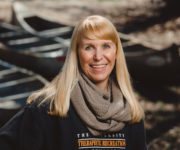Meet the Match
A Serbian Educator Advocates for Inclusion through Sports
For Marko Ristic, sport has always transmitted a kind of magical power—a sense of escape.
Growing up in the Serbian city of Nis during the Yugoslav Wars of the 1990s, Marko’s life had changed drastically. In the early years, his father, a travel agent, and mother, a Serbian language teacher, provided the family with a comfortable life, from ski trips to vacations abroad. After the wars began, however, his parents fought to financially support him and his siblings.
Marko’s joy came on the gymnastics mats. In his youth, his father had been among the best gymnasts in Yugoslavia, and always took Marko to his club to train with him. By the age of 17, Marko had won every award as a youth gymnast.
With the prominent role sport played in his own life, Marko pursued a degree in physical education and sport from the University of Nis’ Faculty of Physical Culture. As he began his career as a P.E. teacher in 2003, Marko and his friends also decided to create a sports club. Initially focused on aggressive inline skating, the club has since morphed into Sports for All, an NGO focused on involving financially underprivileged children in sports. The organization runs year-round projects that serve children with disabilities and intellectual and emotional needs through adaptable versions of speed skating, softball and ultimate Frisbee.
Marko continues to run the club as president, while serving as principal of Branislav Nusic Elementary School. He believes in the power of sport to provide children of all ability levels the opportunity to develop respect, teamwork, fairness and other essential values and skills for their lives. What is most powerful about sports, he says, is its ability to be adapted for all people.
“For example, if you have 10 kids with different abilities and you put them all on the field to play football—if you leave the rules as they are—you will get a mess,” Marko explains. “But if you change the rules a little, you will make something good that everyone can enjoy. Sports connect people together like nothing else.”
There are no official statistics on the number of people with disabilities in Serbia, though a 2010 report estimated the number can be as high as 800,000 people (10 percent of the population). Despite the prevalence of disability, Marko believes ideas of inclusion in Serbia remain very limited.
“Many times, it feels as if people are living in the 19th century when it comes to their views of disability,” Marko says.
Marko feels this lack of creativity and open-mindedness is especially noticeable in the way the handling of sports for children with disabilities. In the Serbian system, sports teams are not usually affiliated with schools, as they are in the United States. Instead, most sports are handled by expensive, private clubs. Children with disabilities, who are sent to special schools and institutions away from mainstream society, often have little to no access to sports activities, unless their schools set up competitions. Reports of neglect in many of these institutions, however, suggests this is not often the case.
In both his roles as a principal and disability sport leader, Marko is pushing for inclusion and increased access to sport. With the recent passing of education law that allows parents of children with disabilities to petition for them to attend mainstream schools, he believes the time is right to push for inclusive education and development of adaptive sports.
“I want to continue involving more kids with disabilities in sports, whether that is in school or with my NGO,” Marko says. “I cannot separate my work—this is my life. I am on a mission to find how I can connect these two areas to make a big difference.”
Marko had access to a network of more than 50 schools and, through the association of physical education teachers, more than 200 individuals with whom he could run inclusion before participating in the U.S. Department of State Global Sports Mentoring Program. After he joined, he was focused on discovering the tools he needed to amplify his impact.
With the support of Angela Wozencroft, professor of therapeutic recreation at the University of Tennessee, Marko had access to a wealth of knowledge on how education and recreation can be combined to provide group and team-building activities that serve both children and students with and without disabilities. Wozencroft, who also serves as the program director for Camp Koinonia, an outdoor education program for 150 children and teenagers with multiple disabilities, also exposed him to how students and volunteers can be used in creating long-lasting and far-reaching inclusion initiatives. As he brought his unique perspective and experience to the U.S., Marko participated in an exchange of ideas that should help to make a positive influence across Serbian society.

